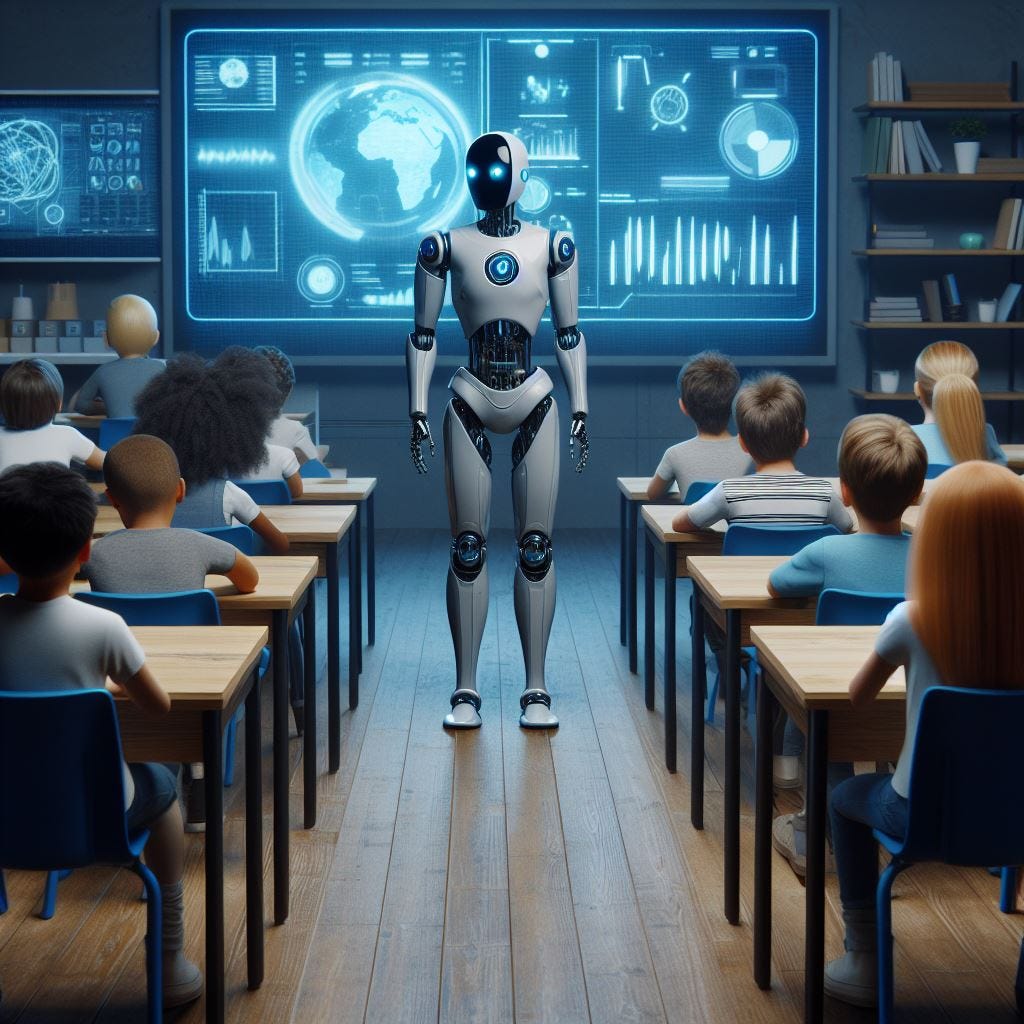
Education currently finds itself at a crossroads. With each breakthrough in artificial intelligence, the age-old classroom appears increasingly reminiscent of a sci-fi set rather than a conventional learning environment.
However, let’s take a moment to consider—does this implies that we are moving toward a future in which educators are supplanted by robots? Or is AI merely another instrument in the teacher’s toolkit, prepared to assist (but not dominate)? Although the implications are profound, this transformation may not necessarily spell the end for human instructors.
The Rise of AI in Education
Artificial intelligence (AI) has become increasingly integrated into the realm of education. With platforms such as Duolingo and Khan Academy’s AI tutors gaining popularity, the landscape is evolving rapidly. These tools are not only swift and adaptable, but they also offer personalized learning experiences.
For instance, consider a student grappling with mathematics: an AI program can assess their performance, pinpoint areas of difficulty and modify lessons instantaneously. This kind of tailored approach is a challenge even for the most skilled teachers, especially when managing a classroom of 30 students.
However, there is an important caveat. Although AI demonstrates remarkable proficiency in logic and data processing, it is fundamentally devoid of the emotional intelligence that characterizes effective teaching. A frustrated fifth-grader attempting to master long division does not merely require a procedural explanation; they also need patience, encouragement and occasionally, a reassuring “I’ve been there too.” Therefore, can AI genuinely emulate that essential human touch?
The Human Element: Why Teachers Matter
Let us discuss Ms. Carter: she has been instructing literature at a high school in Austin, Texas, for a duration of 15 years. Her pupils characterize her as more than merely an educator—she serves as a mentor, a confidant and, on occasion, even a life coach. Last year, one of her students, Emily, encountered challenges with anxiety. Ms. Carter observed the signs, drew her aside and encouraged her to consult the school counselor. Emily now asserts that that conversation altered the course of her life. Could AI have achieved a similar outcome? Perhaps it could have detected Emily’s dwindling engagement in class or pinpointed patterns in her written assignments that suggested anxiety.
However, what it could not offer is that warm, understanding presence which allowed Emily to feel secure enough to share her feelings. This gap illustrates where AI is lacking. Teaching encompasses more than simply imparting knowledge; it involves cultivating relationships, fostering potential and, at times, motivating transformation. Teachers like Ms. Carter remind us that education pertains equally to the heart as it does to the intellect.
AI as an Assistant, Not a Replacement
The optimal point appears to reside in collaboration. Visualize this: an educator employs AI to manage the intricate details—evaluating essays, monitoring student advancement, or developing customized lesson plans. This allows them the opportunity to concentrate on what is fundamentally important: instruction, guidance and motivation. AI might also assist teachers in recognizing educational gaps or patterns within a classroom, thereby providing them with the necessary insights to modify their methods.
Consider, for instance, a pilot initiative in Singapore in which AI is utilized to teach English grammar. In this scenario, instructors concentrate on critical thinking and creativity, while the AI takes care of drills and exercises. Students, as reported, enjoy this amalgamation, as it provides them with structured learning without compromising the essential human connection. However, challenges may still arise in effective implementation, because balancing technology and personal interaction remains crucial.
Real-Life Examples: Where AI Shines
Artificial intelligence (AI) has already demonstrated its value in various contexts. For instance, consider Century Tech, a platform located in the UK that employs AI to develop customized learning paths for students. Educators such as Lucy Ashton in Birmingham commend this tool for assisting her in managing a class of 25 diverse learners. She notes that it feels like having an extra pair of hands, which enables her to focus on nurturing creativity and facilitating discussions.
In another instance, a school district in California adopted AI-powered chatbots to aid students with their college applications. Students were able to inquire with the chatbot regarding deadlines, essay tips, or financial aid. Although the bot delivered immediate and precise answers, counselors intervened when more nuanced guidance was necessary, such as helping student navigate their career aspirations.
These success stories underscore a fundamental truth that cannot be overlooked: AI has the potential to enhance human efforts; however, it is most effective when integrated with human involvement.
The Ethical Tightrope
Nevertheless, it’s not all positive. The emergence of AI in education poses difficult inquiries: Who determines the data that AI employs to make choices? Could algorithms inadvertently sustain biases?
Additionally, what occurs to students in under-resourced schools (who lack access to these sophisticated tools)? AI can broaden the divide between the affluent and the less fortunate. Ensuring equitable access is critical; this will necessitate collaboration among policymakers, educators and technologists.
Looking Ahead: A Partnership, Not a Takeover
What does the future hold? AI will undoubtedly become a (central) fixture in classrooms, ranging from virtual tutors to augmented reality learning experiences. However, it’s unlikely to supplant teachers entirely. Instead, it will function as a partner, streamlining tasks and enhancing learning opportunities.
Teachers will remain the heart of education, as they’ll continue to guide, inspire and connect with students in ways no machine ever could. AI, conversely, will act as the brain—a formidable assistant that elevates education to new heights. Ultimately, the question is not (merely) whether AI will replace teachers, but how it will transform education.
The answer lies in balance: leveraging technology while preserving our humanity. After all, learning encompasses more than just acquiring knowledge; it pertains to growth, curiosity and connection. Because of this, we will always require the human touch.
